Undercurrents and Echoes on Screen: Isabelle Huppert and Bi Gan Engage in a Cross-Cultural Dialogue
As one of the most iconic performing artists in contemporary film, Isabelle Huppert with her profound screen experience, engaged in an in-depth dialogue with Bi Gan, a Chinese director and screenwriter, and Professor Xu Feng, the host, bringing a unique Workshop & Masterclass to the audience of the Beijing International Film Festival (BJIFF).
The Portrait of Isabelle Huppert
The theme of this Workshop & Masterclass is “Undercurrents Beneath the Ice: An Exploration of Isabelle Huppert's Artistic Style”. Starting from Isabelle Huppert's extremely charming characters, the class will talk about acting and her thoughts on her identity as an actress.
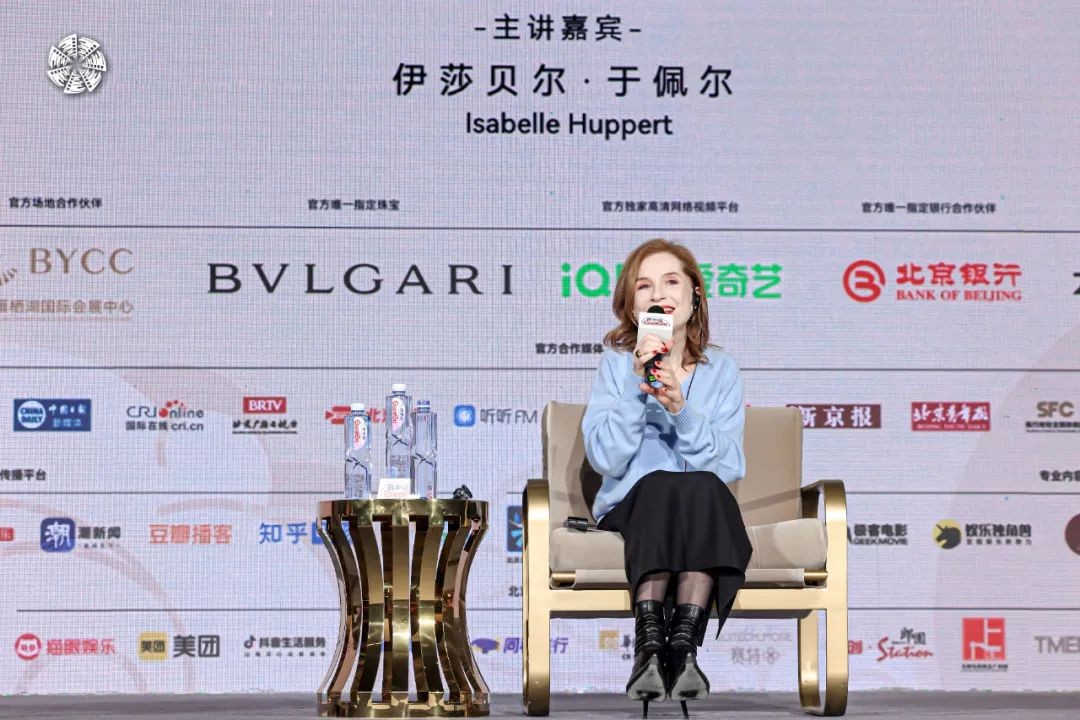
Isabelle Huppert at the Workshop & Masterclass
The Explicitness of the Character and the Expression of the Inner Heart
In 1978, Huppert, who made her film debut, gave an unforgettable performance in Claude Chabrol's Violette Nozière. Her penetrating interpretation of the role not only captivated the audience, but also won the Best Actress award at the Cannes International Film Festival. At the event, Huppert specifically mentioned another work of the same period - The Lacemaker- that was very important to her but relatively unknown in China. It was this film that became the bridge between Huppert and Chabrol, allowing them to work together. “This film was adapted from a novel, which won the most important award in French literature in France at the time. My mother also read the book and said that the novel was written for me. Indeed, someone later approached me, and almost everyone thought that I should play this role.”
Starting with the award-winning Violette Nozière, Huppert and Chabrol have collaborated six times, making them one of the most celebrated golden pair in film history. Huppert shared her memories of working with Chabrol: " Chabrol is a very smart, enthusiastic and knowledgeable director. We can talk to him about everything, music, art, painting, and he knows everything. But like many film directors, he has his own inner world, which he will show and express through his films. Film is his own special language."
At the same time, Huppert also talked about another director, Michael Haneke, with whom she has frequently collaborated and who shares a similar cold and detached style. Their collaboration on The Piano Teacher once again earned Huppert the honor of Best Actress at the Cannes International Film Festival. “I think Haneke is a truly great film director. Especially when I collaborated with him on The Piano Teacher, it deeply touched me. I noticed that Haneke paid great attention to every single gesture and pose of ours. Even the audience mistakenly thought that I really pulled Annie's hair in the film, but actually I didn't. I handled it very carefully and just pretended to pull her hair. And the director hoped that my pretending actions could be as realistic as possible.”
Director Bi Gan, the guest of the event, was also particularly impressed by Huppert's performance in The Piano Teacher. “Her entire character is completely immersed in her own soul. I think I watched The Piano Teacher when I was in college, and I was extremely fascinated by this woman at the time. There is a huge amount of emotional violence and love hidden in this movie, and the shock is even greater than the movie itself.”
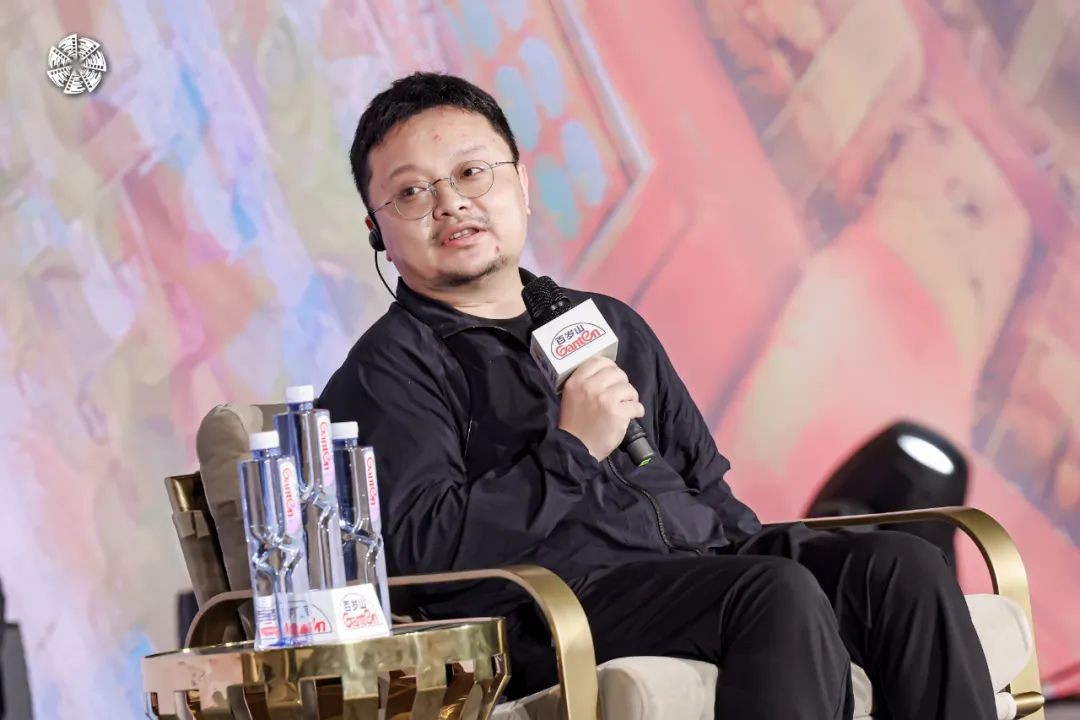
Bi Gan
Resonance of Ice and Poetry on Screen
In addition to long-term collaborations with master directors, Huppert has also been trying in recent years to collaborate with multinational and cross-cultural filmmakers and experimental film artists, allowing cultures with different backgrounds to meet on the screen and presenting breathtaking cultural encounters to the audience.
Among them, the recent collaborations between Isabelle Huppert and director Hong Sang-soo, such as In Another Country, Claire's Camera and A Traveler's Needs, can be regarded as the most fascinating cross-cultural encounters among contemporary filmmakers. Huppert particularly pointed out that Hong Sang-soo's shooting period was very short. In Another Country was shot in only 9 days, and Claire's Camera even took only 6 days to shoot. “Although his shooting time was short, the time he actually invested was enormous. He was able to make me very special in his film, with many surprises and unexpected things, and he allowed me to keep asking questions and looking for answers.”
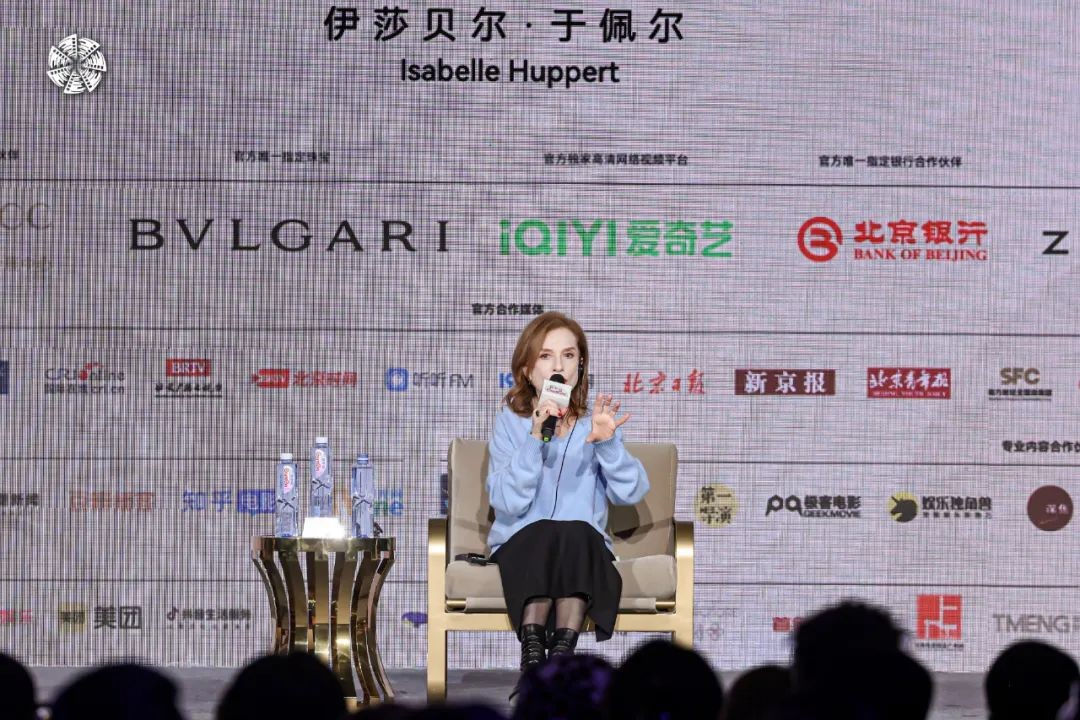
Isabelle Huppert at the Workshop & Masterclass
The 1970s was not only the beginning of Huppert's entry into the film, but also the first peak period of female film creation around the world. Throughout her film career, it can be said that Huppert's interaction with female artists was continuous. For example, Things to Come, which is very popular among Chinese movie fans, was created by Mia Hansen-Løve, the winner of the Best Director Award at the Berlin International Film Festival. Huppert praised the new director, “This is a very delicate film. It is not meant to preach or tell us superficial things. In fact, it is very sensitive and delicate, and very touching. It is the best portrayal of Mia Hansen-Løve's intelligence and wisdom.”
It is worth mentioning that this masterpiece of Mia Hansen-Løve emerged on the international stage almost at the same time as director Bi Gan's Kaili Blues. Bi Gan shared the common theme of searching in the two works: “Searching is an eternal theme in movies. Many questions don't have answers. Therefore, as creators, we often use the approach of searching to deal with a story. Because many propositions contain paradoxes, and they involve fate. We have no way to foresee it or rehearse it in advance, and many paradoxes are beyond our explanation. However, people always live amidst paradoxes. So perhaps apart from searching, we have no other means to deal with the paradoxes of fate.”
Huppert also praised Kaili Blues: “This is a very important discovery for me, and for the French audience as well. Bi Gan's film brings a lot of surprises; it's very good. He obviously uses a different way from the classics, with a strong poetic feeling to bring us into a Dream and a new artistic conception.”
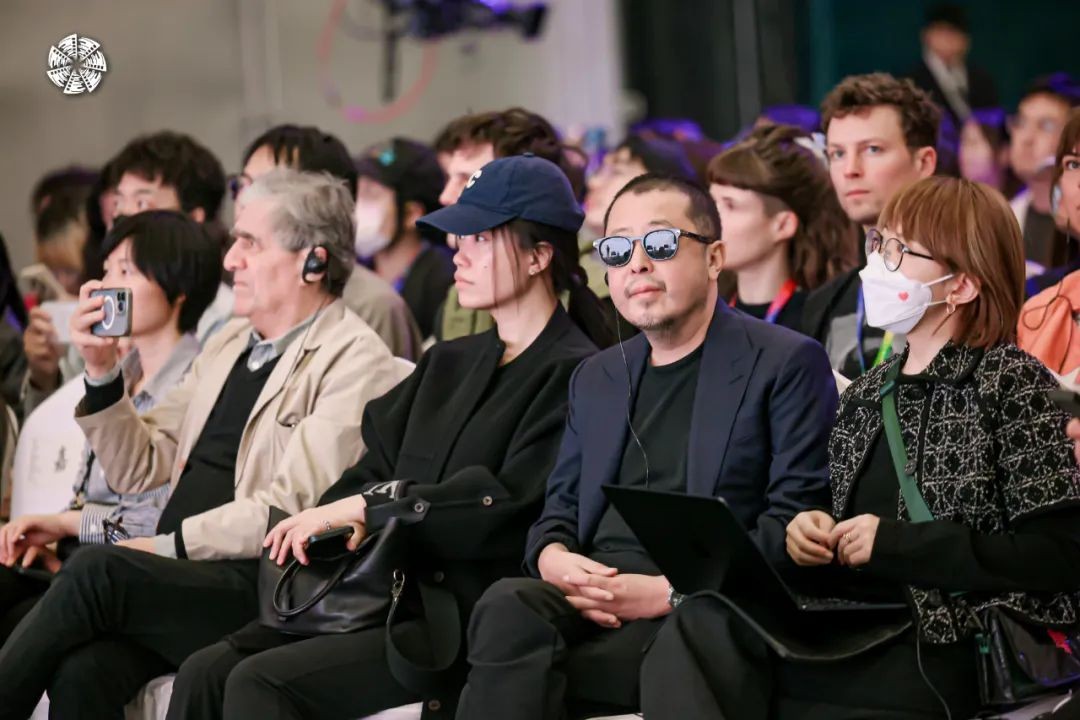
At Isabelle Huppert's Workshop & Masterclass
Diverse Attempts to Break the Boundaries
Even though she has long been an internationally renowned film actress, Huppert is still committed to breaking the boundaries of acting and the identity of an actor. She not only appeared on the silver screen, but also performed in dramas. At the same time, Huppert also supported the creation of many directors as a producer, and served as a Volunteer Ambassador for the 2025 Panorama du cinéma français and went to Shanghai to meet with movie fans.
In recent years, Huppert has stepped onto the Chinese stage many times. In classic plays such as The Glass Menagerie and The Cherry Orchard, she accurately captures the emotional rhythm of each character, turning the barriers of dramatic language into an opportunity for artistic expression with her astonishing ability to bridge languages. Huppert admitted that she gradually entered the field of drama after starring in many movies. “I am very fortunate to have met good directors such as Robert Wilson. It is a great honor for an actor to meet such a drama director. He has changed our view of drama. It is great to be able to travel around the world with these dramas. For example, it is great to meet Chinese audiences with Chekhov's The Cherry Orchard now.” Huppert also expressed her gratitude to the Chinese audience. “For Chinese audiences, watching foreign-language plays poses a certain degree of difficulty, because they need to be extremely focused and keep an eye on the subtitles all the time. Throughout our tour in China, we have felt the high quality of Chinese audiences, which has deeply moved and touched us. So we are truly grateful to the Chinese audiences.”
Huppert was very modest about the help she provided to other directors. “Once an actor gains a certain degree of popularity, it can indeed help the director to move the project forward. We can truly use our experience and popularity to assist the director during the cooperation. Many directors, when shooting their first work, often have no idea what the outcome will be. However, sometimes it is really worthwhile for us to take a gamble.”
In the closing remarks, Professor Xu Feng said that he was deeply moved by Huppert's sharing throughout the event. “Huppert has been working with directors of different genres, different countries, and different languages, and has brought out the charm of the films. I think this is the quality of the greatest actors.”
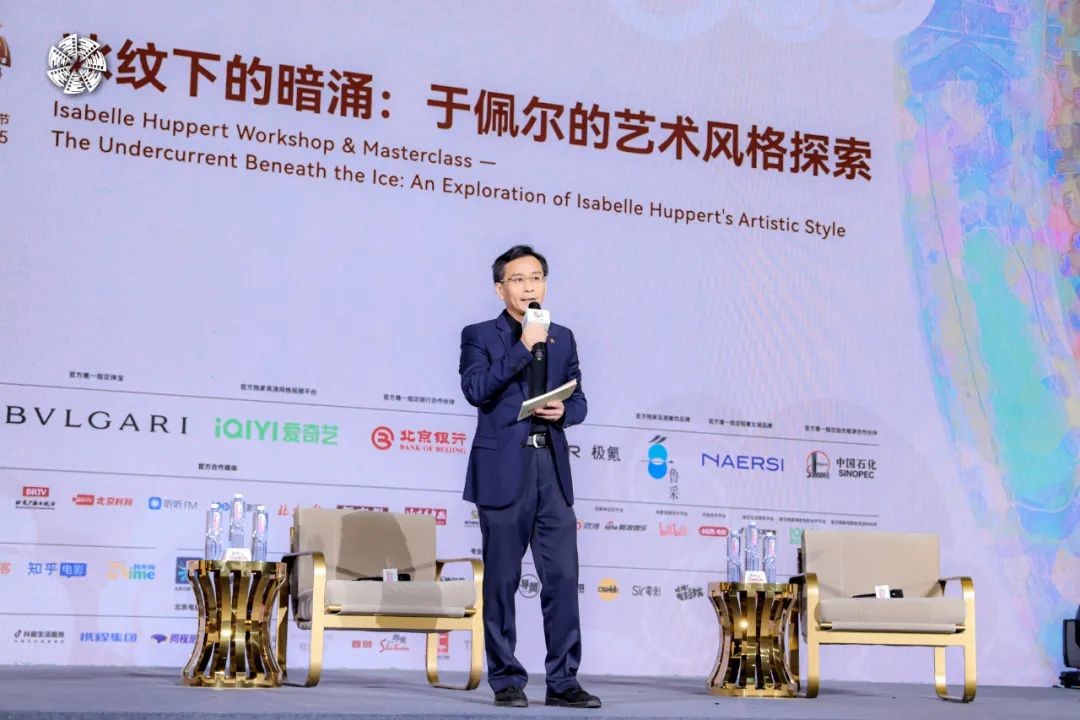
Xu Feng
As Professor Xu Feng said, Isabelle Huppert is always full of vitality and creativity, and she is very sensitive to today's art and reality. In the dialogue of this Workshop & Masterclass, Isabelle Huppert and Bi Gan used film as a bridge to demonstrate the borderless nature and eternal charm of art. From the directors of the French New Wave to the poetic imagery of the new generation of Chinese filmmakers, from classic characters to the interpretation of themes, we believe that this dialogue not only lifts the veil of mystery surrounding film creation for the audience, but also opens a window for future artistic explorations.
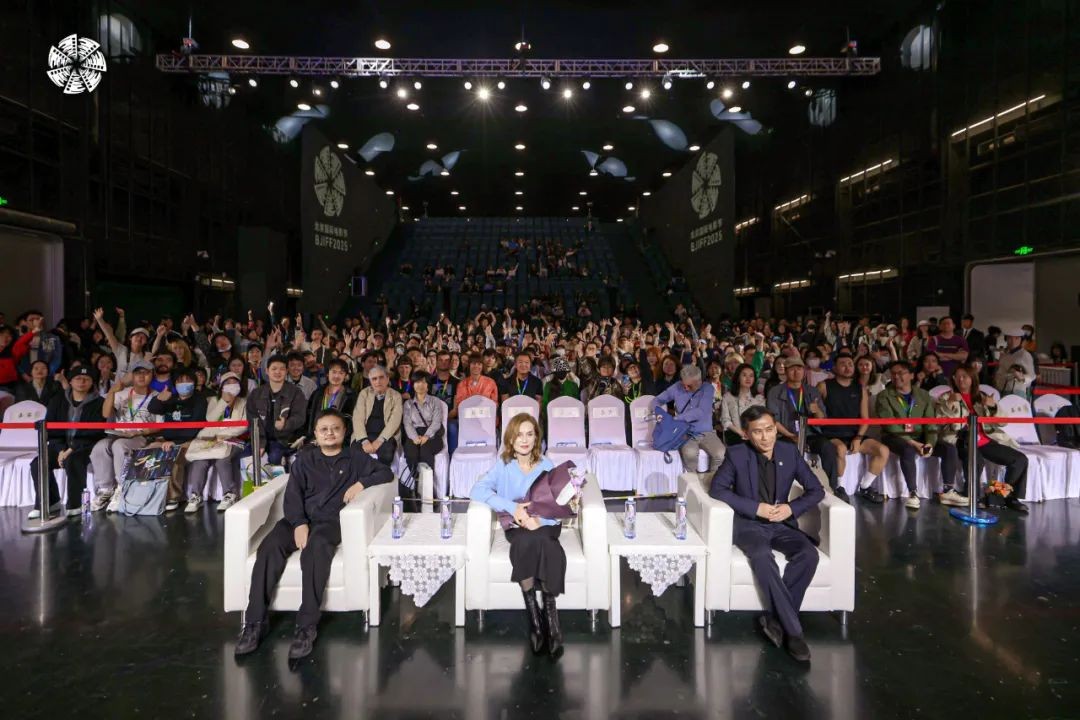
At Isabelle Huppert's Workshop & Masterclass

